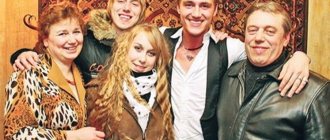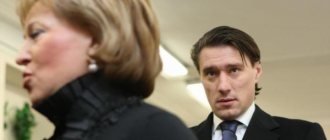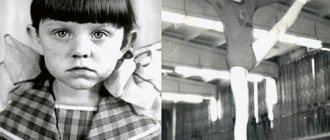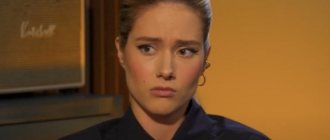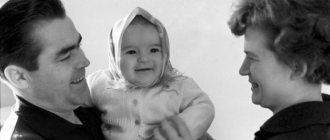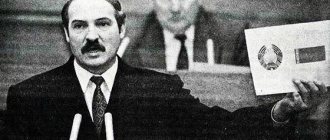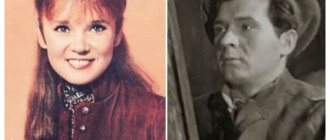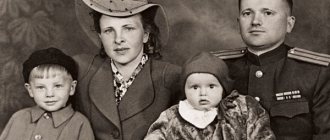Matvienko Valentina Ivanovna (maiden name Tyutina) is known as a politician and diplomat. Valya studied to become a doctor and planned to connect her destiny with medicine, but while studying at the institute, her biography took a different direction. Since 2001, he has been Chairman of the Federation Council and holds the high position of Chairman of the Federation Council. Many people know about Matvienko’s education and political career, but there is practically no information about her personal life. Valentina met her future husband during her student years. Valentina Matvienko’s husband is her classmate at LHFI Vladimir Vasilievich Matvienko. The happy husband and wife lived a long life in a happy marriage until the last days of the husband.
Biography of Valentina Matvienko
Valentina Ivanovna Matvienko (nee Tyutina) is an influential Russian politician, the third person in the hierarchy of the so-called. “vertical of power”, head of the Federation Council, permanent member of the Security Council of the Russian Federation, member of the Bureau of the Supreme Council of United Russia, honorary citizen and former governor of the Northern capital, winner of a number of awards, including the Order of Merit for the Fatherland.
In the photo: Valentina Matvienko
In 2021, in connection with the 70th anniversary of the “Russian Iron Lady,” state leader Vladimir Putin highly appreciated her personal and business qualities and awarded her the highest state award - the Order of St. Andrew the First-Called Apostle.
The speaker's name is included in the sanctions lists of the USA, Canada, EU countries, Australia, and Switzerland. She is considered responsible for the Russian Federation’s violation of the sovereignty and territorial integrity of Ukraine.
How Vladimir and Valentina met
Matvienko and Tyutina (Valentina Ivanovna’s maiden name) arrived in the cultural capital at approximately the same time. Their goal was to enter the Leningrad Chemical-Pharmaceutical Institute. Vladimir and Valentina became classmates. An active and bright girl could not go unnoticed. Tyutina liked Matvienko for his balanced and kind character. The young people decided to get married before graduating from college. And so it happened. The relationship only grew stronger, and the wedding took place in the 5th year of university.
Childhood and family
The future high-ranking official was born on April 7, 1949 in the western Ukrainian city of Shepetivka - small, but located next to a large railway junction.

Valentina Matvienko in childhood
Her father, Ivan Yakovlevich Tyutin, a native of the Penza region, worked as a supply manager in a military unit. Mother, Antonina Kondratyevna, nee Bubley (1914 - 1998), was a local resident, worked as a dishwasher in the same military unit. There, even before the war, the future spouses met.
When the war began, Ivan went to the front, Irina was left with two children in her arms (as Matvienko mentioned in an interview with St. Petersburg Komsomolskaya Pravda in 2021, both children died during the war). Ukraine was under occupation, the entire Jewish population was subjected to genocide. Antonina Kondratyevna risked her life by hiding a Jewish woman and her two children in her underground, but she could not do otherwise.
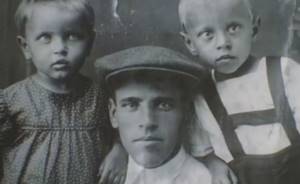
Ivan Tyutin, father of Valentina Matvienko (pictured: with older children)
The head of the family reached Berlin and returned home, but the health of the strong, handsome man was undermined. Despite this, three daughters appeared in the family one after another, Valentina being the youngest. Both of the politician’s sisters, Zinaida and Lydia, are no longer alive: the first was hit by a car at the age of 18, the second died in 2013 from natural causes.
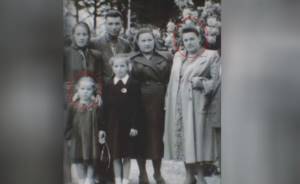
Valentina Matvienko and her mother Antonina Kondratyevna Tyutina
In 1952, the family moved to their father’s small homeland, Russia, but very soon returned to Ukraine and settled in Cherkassy, where the future politician spent his school years. And they were not easy. The mother had to raise three children alone - the father died when Valya was 7 years old. Antonina made a living by sewing costumes for the local theater.
Valentina Ivanovna today
Matvienko still cannot forget the grief of losing her beloved husband. It seemed that they rarely saw each other, but they carried in their hearts the image of a loved one. But Valentina Ivanovna, of course, does not show her feelings to strangers. After all, over decades of holding responsible positions, she has developed the image of a strong woman. Another wound in Matvienko’s soul: she is prohibited from crossing the Ukrainian-Russian border. For this reason, she has not visited her native Shepetivka, Khmelnitsky region of Ukraine, for 7 years. But she used to go there every year.
Valentina Ivanovna does not intend to end her political career. She still deeply regrets that Ukrainian politicians behaved so unpragmatically that they even destroyed economic ties between countries, harming, first of all, themselves.
Nevertheless, now the lonely woman does not lose her vigor and in her spare time deepens her knowledge of German, Greek and English. Matvienko always finds partners for playing tennis or skiing or rollerblading. Her son's family is now her main consolation.
Education
Studying at Cherkassy school No. 19 was easy for the diligent girl. She studied exclusively for A's and B's. True, the information spread online about the graduate’s silver medal is refuted by the school itself, but the fact of her good studies is confirmed. In 1966, that is, after completing the “eight-year” school, Valentina Tyutina entered the local medical school, and in 1967 she graduated with a degree in paramedic.
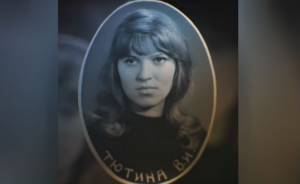
Valentina Matvienko in her school years
Valentina received her higher education in the city on the Neva as a student at the Chemical and Pharmaceutical Institute. She studied well, was an active Komsomol member and enjoyed well-deserved authority among her classmates. Already in her second year, she criticized the secretary of the Komsomol cell, speaking emotionally at a meeting: “What kind of Komsomol life is this? No public events, no construction teams!” She was supported and elected as the new secretary of the student organization.
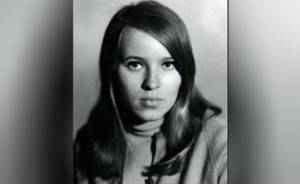
Valentina Matvienko in her youth
After this, social life at the institute changed dramatically. The girl enthusiastically began organizing themed and dance evenings, concerts, competitions, birthday celebrations in construction teams, introducing elements of self-government in the dormitories, and intensifying the work of the student scientific society. Moreover, she was distinguished by her ability to achieve success in all endeavors - the evenings were held with the participation of the most popular VIAs at that time, trips were arranged not only to other cities, but even to Bulgaria.
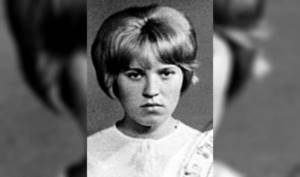
Valentina Matvienko in her student years
In her fifth year, Valentina married her classmate Vladimir Matvienko. She built her further career under his name.
Misappropriation of State Bank
O is the oldest financial institution in Ukraine, which to this day remains one of the largest domestic banks. Founded in 1927, for 65 years the bank was state-owned and served almost all Ukrainian industrial companies. However, in the turbulent 90s, the situation changed: many state-owned enterprises were illegally appropriated by those who had the appropriate capabilities and moral qualities. PIB was not spared the same fate. Thus, in 1992, Vladimir Matvienko, using a simple scheme, appropriated the largest state bank of Ukraine.
Having become the head of the NBU, he understood perfectly well that he would not stay there for long, so he issued an order allowing the “corporatization” of the PIB. After corporatization, the financial institution became the property of its employees, but Matvienko pulled off several frauds that made him the main owner of Prominvestbank.
He managed to do this through four additional issues, as a result of which the banker took possession of 70% of the shares. Despite the fact that the amounts of additional issues amounted to several hundred million hryvnia, Matvienko carried them out calmly, since he used their own money without the knowledge of the shareholders.
Komsomol and CPSU
In 1972, Matvienko graduated from high school and was assigned to graduate school. She had the opportunity to develop in a scientific direction and at first rejected the proposal of the First Secretary of the city committee, Anatoly Gerasimov, to go to work in the district Komsomol committee, since she and her husband already had further plans for life. But after a conversation with both spouses, Gerasimov managed to “entice” such a valuable employee.
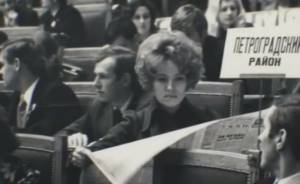
Valentina Matvienko in her youth
The nomenklatura career of a prominent politician began with the position of head of the student youth sector of the Petrograd district Komsomol committee. The scope of her activity was, as at the institute, organizational issues (concerts, competitions, construction teams, shows).
Rapidly moving up the career ladder, she was soon elected secretary of her district committee, and in 1977 - already the first secretary of the regional Komsomol committee. According to Matvienko, during that period she was finally convinced that her true calling was working with people.
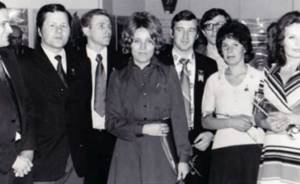
Young Valentina Matvienko (pictured in the center)
An active youth leader, who showed himself well in the Komsomol, was noticed in the structures of the CPSU. In 1984, the 35-year-old politician was appointed first secretary of the Krasnogvardeisky district party committee. In those years, the Communist Youth League was considered a forge of party cadres.
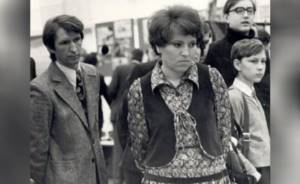
Valentina Matvienko's height is 170 cm
In 1985 she graduated from the Academy of Social Sciences under the CPSU Central Committee. Then, from 1986 to 1989, the successful civil servant, as deputy chairman of the executive committee of the Leningrad City Council, oversaw issues of education and culture. After that, she was delegated to the Supreme Council of the USSR. Over the next three years, she was a deputy and headed the committee on women's affairs.
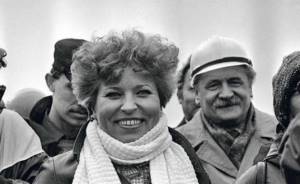
Politician in the 80s
Attempts to get into parliament
The Party of National Economic Development of Ukraine (PNERU), whose leader is the son of Vladimir Matvienko, is once again trying to enter the Verkhovna Rada. Despite the constant failures, the banker was not going to stop, spending millions of hryvnia on Prominvestbank shareholders for election campaigns.
Naturally, the oligarch finances PNERU for a reason. Upon coming to parliament, Matvienko plans to release under an amnesty all those accused of economic crimes, replacing punishment with compensation for losses caused. In addition, according to the party program, the businessman intends to allow enterprises to bail out criminals. All this suggests that in this way Vladimir Matvienko wants to insure himself against the likely consequences of his criminal activities.
In the meantime, the banker has no political influence, he thought of a backup escape plan. With the stolen money, Matvienko bought himself an island in the Seychelles. Apparently, to have somewhere to hide in case of “force majeure”.
Ministry of Foreign Affairs
Shortly before the termination of the activities of the Supreme Council of the USSR, Valentina Ivanovna expanded the range of her responsibilities. She was 40 when, as a rare representative of the fairer sex among deputies, she was seated in the same box with the Queen of Spain - to accompany the royal person who had arrived in Moscow to listen to a concert of classical music. Valentina quickly won over the guest, which was witnessed by Foreign Ministry employee Igor Ivanov.
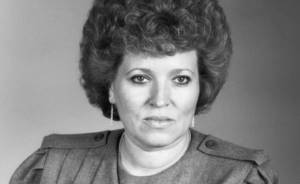
Valentina Matvienko at 40 years old
Afterwards, it was decided, firstly, to train more “female” personnel for the Ministry of Foreign Affairs, and secondly, to send Valentina Ivanovna to advanced training courses at the Diplomatic Academy of the Ministry of Foreign Affairs. In 1991, she left for Malta as ambassador.
According to the recollections of her colleagues, having outstanding business qualities and feminine charm, Matvienko was an indispensable employee - she knew how to talk meaningfully, build relationships with the right people and gain access to any office. It was inconvenient for representatives of the local elite to refuse such an extraordinary woman.
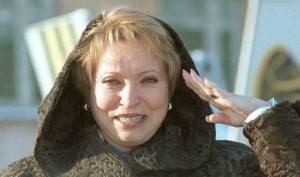
Valentina Matvienko in the 90s
The collapse of the USSR did not interrupt the career of a talented diplomat. She returned to the capital of the Russian Federation only in 1994 and continued to work at the Ministry of Foreign Affairs. At that time, she held various positions - she headed the departmental department for relations with the constituent entities of the Federation, and was a member of the board of the ministry.
In 1997, Matvienko received a new appointment - Russian Ambassador to Greece. At that time, this state was in difficult relations with Turkey, and the task of diplomats was to support relations with both countries. Valentina Ivanovna then spoke in Greek, winning over Greek politicians and adding to her knowledge of Ukrainian, English and German, her command of this language. She demanded reports and plans from her subordinates and played an important role in maintaining good relations with Athens during the difficult period of integration of Greece and the European Union.
Stealing from your clients
When any bank is headed by dishonest managers, this will definitely affect ordinary depositors.
Unfortunately, Prominvestbank also became famous for its dishonest attitude towards its clients. One of the illustrative cases was related to the state-owned enterprise Energoatom, from which PIB management stole $4.2 million.
First, Vladimir Matvienko’s henchmen, together with corrupt Moldovan bankers, sued Energoatom, demanding that the company return the specified amount, allegedly missing from the Prominvestbank correspondent account. Obviously, the oligarch also bribed the judge, since he, without establishing Energoatom’s guilt, collected more than 4 million hryvnia from the enterprise.
A key role in this criminal scheme was played by an offshore company controlled by Matvienko, to which the money taken from Energoatom was ultimately transferred.
Government of the Russian Federation
In 1998, Yevgeny Primakov, the new Prime Minister of the Russian Government, interrupted Matvienko’s diplomatic activities, with whom he had been familiar since the time they worked together in the Supreme Council of the USSR (he then headed one of the two chambers, and she headed the Committee on Women’s Affairs). The Prime Minister recalled her from Greece to appoint her as his deputy.
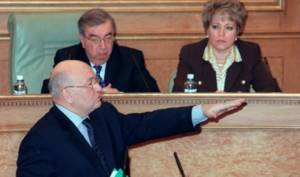
Valentina Matvienko considers Evgenia Primakov her teacher
The times were difficult, and the situation regarding the social issues that she had to resolve was catastrophic. Near the White House, miners beat their helmets on the asphalt, demanding wages, and the wives of officers who had nothing to feed their children appeared on television. But the former diplomat knew how to speak extremely convincingly, convincingly, and find the right words and solutions to the most difficult issues.
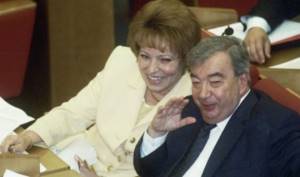
Matvienko and Primakov
Within a month, together with Primakov, she managed to arrange the payment of allowances to military personnel, salaries to public sector employees, begin the indexation of pensions after default, and introduce the funded part of pensions. Although, along with her personal qualities, her success, of course, was also facilitated by the general improvement in the economic situation in the country. Valentina Matvienko about the presidential elections in 2000 and 2018 Subsequently, she effectively supervised the social sphere as deputy prime minister in the next three governments - Sergei Stepashin, Vladimir Putin, Mikhail Kasyanov. Matvienko’s colleagues stated that, although she does not offer any radically new ideas, she can find a way to approach anyone, make incompatible things work together, and this is the main function of the deputy prime minister.
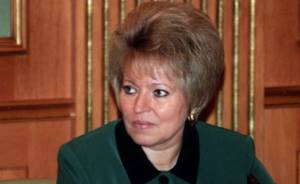
Valentina Matvienko in the Government
In 1999, Matvienko almost lost her position: there is an opinion that President Boris Yeltsin suspected Primakov and Moscow Mayor Yuri Luzhkov of plotting against him, and Matvienko, as he put it, “darted” between them, which caused the leader of the nation to suspect her loyalty . Unable to withstand his pressure, Valentina informed her new boss, the young Prime Minister Vladimir Putin, about her dismissal. He protected her from further attacks.
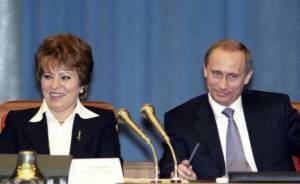
Valentina Matvienko and Vladimir Putin
Subsequently, Matvienko was glad to have the honor of working on the same team with Putin and always took his side. Here's what the prime minister and president said about her:
Loss Management
No matter how large and successful an enterprise is, without competent management it is doomed. This is once again proven by the history of Prominvestbank, which has been losing its position year after year.
One of the main reasons for the rapid decline was unjustified lending to economically hopeless companies. If any enterprise wants to take out a loan, then any bank will not only require all the necessary documentation, but will also check the company on all points.
However, the head of Prominvestbank was happy to work with businessmen-swindlers. And it’s not that Vladimir Matvienko was so naive, it’s just that in return for the loans he received good kickbacks.
Naturally, businessmen who were already involved in financial fraud from the very beginning often resorted to various scams in order not to repay their loans. In addition, the bank did not have a clear deposit policy.
As a result, loan debt increased, and the resource base was practically not replenished. As a result of all this, Prominvestbank slowly sank.
Governor of St. Petersburg
In 2000, the first attempt was made to make the active Deputy Prime Minister the governor of the Northern capital.
However, her rating was then too small compared to the main competitor, the current head Vladimir Yakovlev. She had to withdraw her candidacy and accept the appointment as presidential plenipotentiary for the North-West region. Valentina Matvienko. Debates In 2003, after a well-conducted election campaign and Yakovlev’s early departure from the post for the specially created position of Deputy Prime Minister for Housing and Communal Services, Valentina Ivanovna nevertheless took the chair of the head of St. Petersburg, winning after two rounds: in the first round she received slightly less than half the votes , and in the second she scored 63%. By a large margin, the head of the Frunzensky district, Anna Markova, came in second place, and the third place went to the candidate “against everyone.” The election campaign was not easy for her - her competitors threw tons of dirt. At a television debate, one of her opponents asked her a question: “Is it true that in your youth you had the nickname Valka the Glass?” [reference to rumors that in her youth at Komsomol congresses she had to drink with the “right” people - approx. uznayvse.ru]. Valentina instantly pulled herself together and answered: “I don’t remember about the glass, but it was half a glass. But you didn’t?” The woman won the elections, but the nickname “Valka-glass” went to the masses.
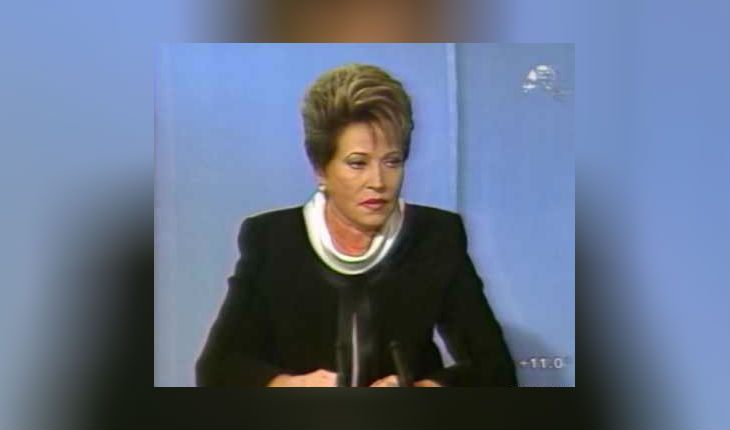
Valentina Matvienko in 2003
The next 8 years passed under the auspices of the “era of Valentina Matvienko.” The city, of course, went to the new owner in a deplorable state, but by the end of her governorship the difference was noticeable to the naked eye.
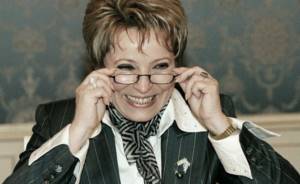
Valentina Matvienko – Governor of St. Petersburg
To increase the budget, she began to attract large investors to the city. For example, in 2005, the administration signed a cooperation agreement with Lukoil and allocated three dozen plots of land for the construction of gas stations. Then, enterprises of the world's auto giants appeared in the city: Toyota, Nissan, Hyundai. As a result, in eight years, Matvienko managed to achieve a fourfold increase in the city budget.
In 2006, the State Duma supported the governor’s important initiative to pay residents of besieged Leningrad two pensions - old age and disability. For a long time, this idea did not find the proper response from parliamentarians. But Matvienko was able to enlist the support of Vladimir Putin (for him, a native of Leningrad, this topic is still acute), and the bill was adopted.
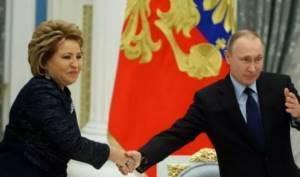
In the same year, with the approval of the president, the head of St. Petersburg resigned and was reappointed to the post for another term until 2011 (according to the new appointment procedure that replaced democratic elections). In 2009, the politician joined the United Russia party and joined its Supreme Council.
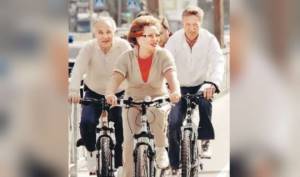
2008: Valentina Matvienko tests a new bike path
It should be noted that opponents of the reforms introduced during that period were not pleased with many of the mayor’s innovations. Significant changes in the appearance of the city were especially criticized by residents of the cultural capital. It was painful for them to see how new buildings appeared on the site of hundreds of wonderful architectural monuments, and measures were taken to densify the buildings. The townspeople were also dissatisfied with the fact that the entire development of the city was controlled by the official’s son, Sergei Matvienko.
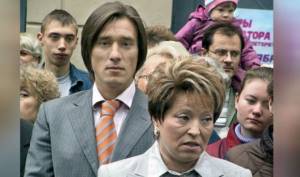
In the photo: Valentina Matvienko and her son Sergei
In particular, the idea of building a 300-meter Gazprom City skyscraper opposite Smolny was actively discussed in the media at that time, approved by the governor. According to an online survey, the number of opponents of construction exceeded the number of supporters by an order of magnitude. Residents of St. Petersburg held rallies and achieved refusal to build a monument to the gas monopolist, the appearance of which could lead to a violation of the architectural environment of the city on the Neva and the exclusion of the historical center from the UNESCO World Heritage List. Matvienko about the Okhta Center The building nevertheless appeared, but in an improved form and in a different place: in Lakhta, so that the 460-meter futuristic tower would not disturb the historical ensemble of the center. And this happened already at the end of Georgy Poltavchenko’s governorship.
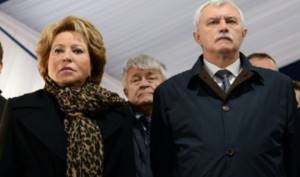
Right: Georgy Poltavchenko, Matvienko's successor
The indignation of St. Petersburg residents was also caused by the inability of the authorities to cope with communal problems due to the snowy winter. Allegedly, instead of increasing the number of snow removal machines, the governor proposed involving homeless people and students in cleaning the streets. People died from falling icicles in the city, including a six-year-old orphan boy. But in response to criticism, the governor argued that the city was being cleaned much better compared to the winter of 2009-2010, that the atmosphere was being escalated to discredit her, and recommended that children and the elderly not leave the house unless absolutely necessary.
After leaving the governor’s post in 2011, Matvienko summed up the results of her reign: “In 2003, St. Petersburg created the impression of a provincial city. Now there is a completely different energy and rhythm of life here.”
Speaker of the Federation Council
In 2011, President Dmitry Medvedev initiated the transfer of the head of St. Petersburg to the capital. Matvienko won the municipal elections necessary for nomination to the upper house of parliament, receiving a high (more than 95) percentage of the vote. This circumstance caused suspicion and a wave of criticism on social networks and from the opposition. The politician herself had no doubt about the results of the expression of the will of St. Petersburg residents. The leader of the country immediately approved the resignation of Valentina Ivanovna from the post of governor, and acting. The head of St. Petersburg, Georgy Poltavchenko, appointed her a member of the Federation Council, a representative from the executive body of government. A month later, on September 21, the Federation Council elected the ex-governor of St. Petersburg as its speaker, essentially the third person in the state. The next day, Matvienko automatically joined the Security Council of the Russian Federation, and a year later, due to changed legislation, she became a member of the State Council.
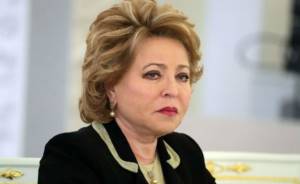
2011: Valentina Matvienko – Speaker of the Federation Council
As chairman of the Federation Council, Matvienko always unconditionally supported the Kremlin’s position on most issues of domestic and foreign policy. Under her, the Federation Council unanimously approved the so-called “anti-orphan law”, prohibiting US citizens from adopting Russian orphans, and also gave consent to the president to use Russian armed forces in Ukraine and Syria.
Between 2012 and 2015. The chairman of the Federation Council four times topped the rating of the most influential women in the country according to a number of publications (RIA Novosti, Ekho Moskvy, Ogonyok).
Long interview with Valentina Matvienko (2016) Supporting the state program “Accessible Environment,” the politician advocated strengthening measures to integrate citizens with disabilities into society. She called for an investigation into the outrageous case that occurred in 2015, when in Nizhny Novgorod the owner of a cafe asked the autistic sister of Russian supermodel Natalia Vodianova, Oksana, to leave the establishment.
In 2021, the Chairman of the Federation Council proposed suspending the activities of collection services after the tragedy that occurred in Ulyanovsk. There, demanding repayment of the debt, the collector threw a bottle of Molotov cocktail at the window of the borrower’s apartment. As a result, a two-year-old child and his grandfather suffered serious burns.
During the same period, during the visit of the Federation Council delegation to Singapore, the speaker took the initiative to introduce in Russia the experience of this republic in the fight against corruption. She considered the effective system of anti-corruption measures operating in Singapore to be of great interest to the Russian Federation - from instilling aversion to bribery to the concept of developing a kind of immunity to this phenomenon as such.
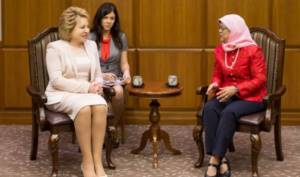
Speaker of the Federation Council in Singapore
In 2021, Valentina Ivanovna supported the draft law on raising the retirement age, despite the massive street protests of the population against such a reform that took place in Russian cities. According to her, when preparing the amendments, the Federation Council “intends to propose a whole range of measures to protect citizens,” including health care programs for pensioners.
In the same year, at a press conference following the spring session, the speaker called for humanizing the application of Article 282 of the Criminal Code, which provides for liability for statements on the Internet and reposting messages of an “extremist” nature, since in some cases completely correct materials fell under the article. Later, the Federation Council approved a law signed by the president to soften this article.
Valentina Matvienko about Russian President Vladimir Putin According to Matvienko, the humanization of society is necessary and extremely important for the development of the country. In this regard, after numerous cases of torture of convicts by officials of the Russian penitentiary service were revealed in 2018, she spoke out about the need to reform the Federal Penitentiary Service. As a solution to the problem, the speaker recommended separating the functions of re-education and prisoner protection. From her point of view, it is advisable to entrust the work of educating and socializing offenders to the civil service, open to society.
At the first meeting of the Regional Health Council, created in 2021 in the upper house of parliament, Matvienko made a proposal to create a program for the reconstruction, repair and construction of children's hospitals, since more than half of them did not meet modern requirements. The draft decisions of the meeting also included a recommendation to the Federation Council of the Ministry of Health to continue implementing the pilot project “School Medicine” in order to prevent diseases among students.
At the end of the same year, the State Duma adopted a bill on tax incentives for persons providing support and material assistance from personal funds to cultural institutions. The project was submitted for consideration by a group of deputies led by the head of the Federation Council Valentina Matvienko and former speaker Sergei Naryshkin.
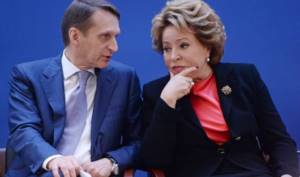
With Sergei Naryshkin
In the summer of 2021, during the All-Russian Youth Educational Forum “Territory of Meanings,” held at the Senezh Management Workshop in Solnechnogorsk near Moscow, Valentina Ivanovna spoke out against the adoption and raising of children by same-sex couples. In her opinion, such a possibility could undermine the foundations of society and lead “to the degeneration of humanity.” During the same period, she paid an official visit to Cuba to coincide with the 500th anniversary of Havana, which was celebrated on November 16. The program for celebrating the capital's anniversary included performances by stars of the St. Petersburg Ballet Theater Boris Eifman, a demonstration of the photo exhibition “Frozen Music of St. Petersburg,” and the opening of the Capitol building after renovation.
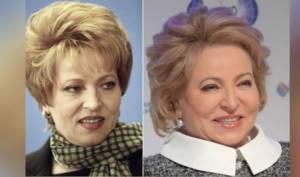
How Valentina Matvienko has changed (2000 and 2018)
Earlier, at the request of Cuban parliamentarians, Valentina Ivanovna assisted in organizing work to update its dome, which needed a new gold coating, and in attracting the best Russian restorers to resolve the issue. Help in restoring the beauty of the structure, recognized as the national treasure of the republic, was a gift from the Russian Federation to the people of Liberty Island.
Personal life of Valentina Matvienko
Since 2021, the chairman of the Federation Council is a widow.
On August 30, Vladimir Vasilyevich Matvienko died. In the last years of his life, he was sick a lot and could no longer move without a wheelchair. Valentina Ivanovna and Vladimir Vasilyevich studied at the institute together, in their fifth year, after a long romance, they started a family and lived together for more than four decades. In 1973, their son Sergei was born.
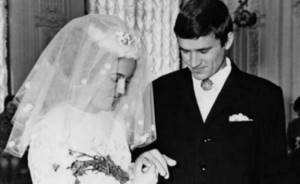
Wedding of Valentina Matvienko
After university, the husband built a career in the party for a short time, quickly realized that it was not for him, but was always calm about his wife’s dizzying career successes. Subsequently, he taught at the Military Medical Academy of St. Petersburg and did not accompany Valentina on diplomatic trips (to Moscow, Malta, Greece).
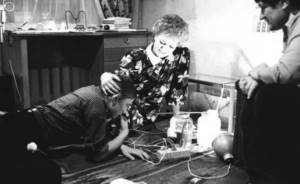
Valentina Matvienko with her husband and son (1987)
When Valentina Ivanovna became the governor of the Northern capital, the family was finally reunited. After his retirement in 2000 with the rank of colonel of the medical service, Vladimir lived in a country mansion. In the last years of his life his health deteriorated and he was confined to a wheelchair. A hired assistant helped him with the housework.
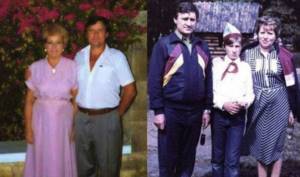
Family of Valentina Matvienko
Son Sergei received two diplomas (in the specialties “international economics” and “finance and credit”) After Valentina’s appointment as governor, he became her adviser on the fuel and energy complex. In 2004, the young man took the post of vice president of VTB Bank, then headed VTB Capital CJSC, and was the owner and co-owner of a number of large companies.
In 2004, he married pop singer Zara. Their wedding took place in the Kazan Cathedral. For Sergei’s sake, she converted to Orthodoxy, but after a year and a half the couple separated.
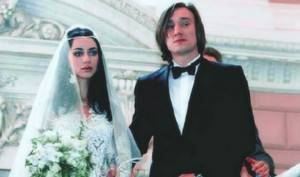
Singer Zara is Valentina Ivanovna’s first daughter-in-law
According to the media, the speaker’s son is a dollar billionaire and a lover of noisy holidays. He celebrated his 35th birthday at the Yusupov Palace. According to journalists, the event cost him 60 thousand euros.
In 2008, a successful businessman and Doctor of Economic Sciences married graduate student Yulia, a year later, on April 7, who gave him a daughter, Arina, the long-awaited granddaughter of Valentina Matvienko. According to the church calendar, it turns out that Valentina and the baby were born on the same day.
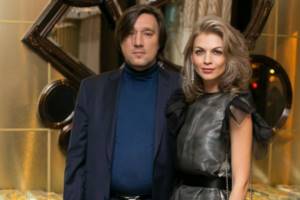
Sergei Matvienko with his wife Yulia
The speaker's daughter-in-law is also engaged in entrepreneurial activities - together with her close friend Valentina Krupnik, she created a new brand of designer women's clothing and runs the JM Studio showroom.

Arina Matvienko, the only granddaughter of Valentina Matvienko
For Matvienko’s 70th birthday, the Russia-1 channel filmed a documentary film “Valentina”. In an interview with him, the president and high-ranking officials recalled the years of joint work, spoke about his best qualities - courage, determination, the ability to empathize, warmly congratulated him, and called him “the passionary of the era.”
Bank employees about Vladimir Matvienko
The comments of his employees speak eloquently about the owner of Prominvestbank. According to bank employees, whose names are hidden for obvious reasons, Vladimir Matvienko is a person with a strong and difficult character. This is manifested in his speech, manner of speaking, and attitude towards his colleagues.
Some PIB employees claim that the businessman almost always speaks in an orderly tone, almost never discusses his orders, and can often be rude and tactless (for which, according to rumors, he was fired from the post of head of the NBU).
Matvienko also does not like journalists and is constantly suing some publications. There is only one newspaper to the oligarch's liking - Obriy, which he himself finances. And it’s clear why: whoever pays calls the tune.
Well, one more “sin” that Matvienko’s colleagues could not fail to mention is that their boss likes to drink. He drinks, as they say, often and a lot. Mostly moonshine. Often goes on a binge.
In addition, the oligarch has a weakness for women: he often drinks with representatives of the fair half of humanity, especially with his colleagues Malka and Paskhalova.
Valentina Matvienko now
Among the initiatives of Valentina Matvienko at the beginning of 2021 is a statement on the need to extend to diplomats and other persons holding key government positions the ban on foreign citizenship and the issuance of residence permits abroad. In her opinion, insufficient attention was paid to this problem. She emphasized that expanding the list of persons not entitled to dual citizenship is required to strengthen the state. The Chairman of the Federation Council asked the Parliamentary Committee on International Affairs to work on this issue. Earlier, the President of the Russian Federation, in his address to the Federal Assembly, proposed introducing such a ban into the Constitution.
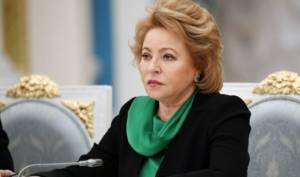
Valentina Matvienko, now
Chairman of the Federation Council, also stated the importance of immediate consideration of amendments to the Basic Law of the country proposed by the head of state, and called for its completion during the spring session. She said that the upper house of parliament would hold a special meeting for this purpose immediately after the constitutional legislative acts are approved by the State Duma.
